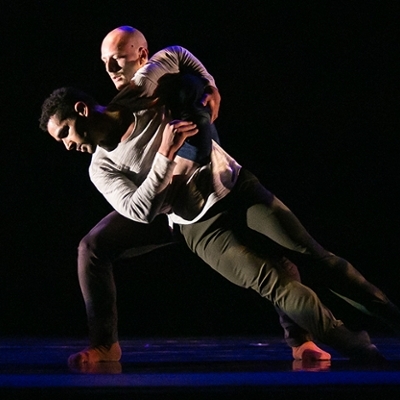Explore Dance
Dancing at Wesleyan can include dance making, performance, community engagement, global perspectives, the embodiment of ideas and interdisciplinary experimentation. Explore the possibilities below!
-

Composition
The emphasis of the major is on creating original work and scholarship, be it choreographed or written. Students can choose from a number of courses focusing on solo, group, site specific and theme specific composition and culminate in a produced concert. Our upper level hybrid studio/seminar courses have students creating and performing work, bringing theories and ideas into physical practice.
Courses include: -

Engagement
Dance is a collaborative art. Our students have opportunities to work closely with faculty and staff, and engage with off-campus communities locally and internationally. We also offer service learning courses through which students can develop and teach dance in the community.
Internships through the College of the Environment
The Center for the Arts offers many interesting opportunities, jobs, and internships working with visiting artists and events on campus.
-

Global Perspectives
The Dance Department is a contemporary program with a global perspective. The program embraces classical forms from Bharata Natyam, Ghanaian, Ballet, Javanese, and vernacular forms from jazz, hip hop, Eastern European social dances, to experimental practices that fuse tradition and experimentation into new, contemporary forms.
Hari Krishnan A Contemporary Approach to Teaching Bharatanatyam Dance
Artist in Residence and choreographer Iddi Saaka and Adjunct Assistant Professor of Music and master drummer John Dankwa share some history and a performance of West African Drumming and Dance at Wesleyan University.
Courses include:Introduction to Contemporary Dance from Global Perspectives
- West African Dance 1, 2, 3
- Bharata Natyam 1, 2, 3
- Performing Indonesia
- Contemporary Dance Technique 1, 2, 3
- Ballet 1, 2
- Jazz
- Hip Hop
- Afro-Brazilian Dance
Mobilizing Dance: Cinema, the Body, and Culture in South Asia
-

Social Activism
Dance is the power to envision, move and change. Dance is action.
Hari Krishnan, Liquid Shakti: As a part of the Spring Faculty Dance Concert, Indian dance artist-in-residence, Hari Krishnan, premiered a solo work inspired by the myth of the river goddess Ganga which responds to the depletion of natural resources by aggressive industrialization, told from the point of view of some of the most vulnerable populations.
Courses include:Perspectives in Dance as Culture (multiple topics)
Current topic: Queering the Dancing Body: Critical Perspectives on LGBTQ RepresentationMobilizing Dance: Cinema, the Body, and Culture in South Asia
Embodiment and Education: Critical and Liberatory Perspectives
Delicious Movement: Time is Not Even, Space is Not Empty
Deeper Ecology: Moving to Connect with Earth and Environment
Dance As Activism (will be implemented in 2019-2020)
-

Interdisciplinary
The major is designed to provide broad and deep exposure to the discipline of dance as a critical, embodied, reflexive and socially engaged research method. The department conceives of dance performance broadly, embracing traditionally staged performances, site-based works as well as mediated and interdisciplinary performative modes. In addition to courses in choreography, improvisation, education, research methods, dance ethnography, history, and dance techniques, Wesleyan offers unique interdisciplinary courses that integrate varied modes of learning. The curriculum focuses on providing students with the skills to develop new knowledge and produce original research expressed through performance, writing and their vital intertwining into new hybrid forms
Katja Kolcio and Manju Hingorani, Body Languages: Choreographing Biology
Eiko Otake and Bill Johnston, The Atomic Bomb: A Study in Movement and History
Courses include:Perspectives in Dance as Culture (multiple topics).
Current topic: Queering the Dancing Body: Critical Perspectives on LGBTQ RepresentationMobilizing Dance: Cinema, the Body, and Culture in South Asia
Embodiment and Education: Critical and Liberatory Perspectives
Delicious Movement: Time is Not Even, Space is Not Empty
Deeper Ecology: Moving to Connect with Earth and Environment

